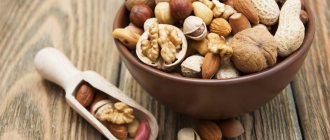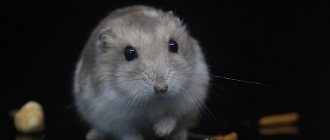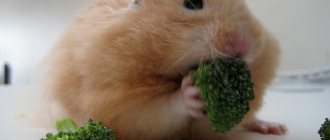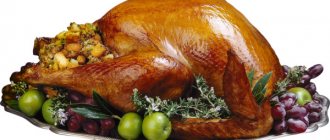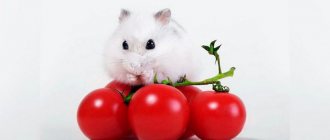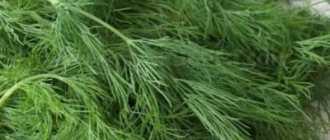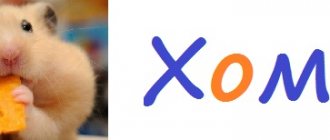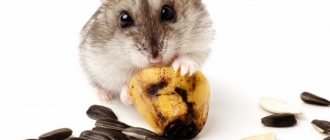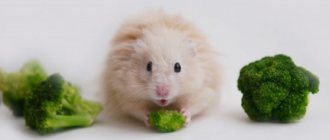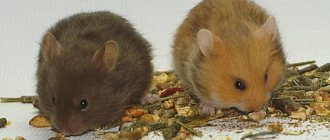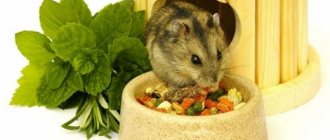The natural food of small rodents living in nature are seeds of cereal plants, legumes, berries, fresh stems and leaves, and insect larvae. Animals kept at home are forced to eat what their owner feeds them. The principle “proper nutrition is the key to health” should apply not only to people, so before getting a pet, you need to think about its diet. For example, you need to understand whether hamsters can eat seeds? In what form is it better to offer your pet a treat? There are several possible answers to these questions.
Sunflower
Sunflower seeds are a component of specialized food mixtures for rodents, because they are part of the animals' natural diet. The seeds contain beneficial substances that have a positive effect on the heart, blood vessels, and nervous system of the baby’s body. This:
- vitamins (A, E, D and group B);
- minerals (iodine, zinc, calcium, iron, etc.);
- amino acids;
- polyunsaturated fatty acids.
Therefore, the answer to the question whether it is possible to give your pet sunflower seeds will be positive. You even need to give these seeds to your hamster. But there is a limitation. Since sunflower grains contain 30% vegetable oil, they are very high in calories. It is not recommended to feed your pet them often. This will lead to health problems associated with obesity.
What vegetables can you give hamsters?
The vegetables hamsters like to eat most are:
- red pepper;
- tomatoes in small quantities;
- carrots;
- radishes;
- pumpkin;
- zucchini.
To guarantee, it is advisable to peel ripe fruits. It is strictly forbidden to give your pets cabbage, which can cause bloating, as well as difficult-to-digest potatoes.
Most owners still cannot come to a conclusion whether it is possible to give watermelon to a hamster. The fact is that early cultivation of berries and vegetables in greenhouse conditions using nitrates can have a detrimental effect on the health of not only humans, but also animals. You can feed your pet only with foods that you have grown yourself. So, you shouldn’t take the risk and feed your hamster purchased watermelon. Food that makes a person feel unwell can cause poisoning in a pet.
Pumpkin
Can hamsters have pumpkin seeds? Pumpkin seeds are also a source of valuable nutrients. A whole complex of beneficial components of these grains helps lower cholesterol levels, maintain blood composition within normal limits, and establish proper functioning of the heart and vascular system. In addition to vitamins, calcium, phosphorus, iron, copper, selenium, zinc, magnesium and potassium, pumpkin seeds contain the substance cucurbitin. It has an anthelmintic effect. Including pumpkin seeds in your baby’s diet will protect him from parasites, maintain health, and prolong life.
What do Syrian and Djungarian hamsters eat in the wild?
Djungarian hamsters live in dry environments and their diet consists of seeds, available vegetation and small insects. They drink little water. They can do without it for several days.
The Syrian hamster, accustomed to better natural conditions, eats a much more varied diet. Its "wild" diet includes:
- Protein food - caterpillars, worms, small insects, larvae.
- Juicy food - greens, berries and fruits, vegetables.
- Grains.
- Small rodents.
Melon and watermelon
What seeds are best to offer to your pet? Watermelon or melon? The seeds of both of these melons can be fed to hamsters. Melons will especially benefit pregnant females because they contain folic acid, which is necessary for the proper development of the offspring. Components such as vegetable proteins and fats are necessary to build the muscle tissue of the animal.
Watermelon seeds are rich in vitamin D, polyunsaturated fatty acids, as well as other elements necessary for a full life for an animal.
What do they eat at home?
Hamsters will eat whatever you give them. But don’t feed them everything - the food we are used to can be deadly for these rodents.
Dry cereals are useful for a hamster: buckwheat, oats and rolled oats, barley, legumes, as well as nuts, sunflower and pumpkin seeds. Rice is given extremely rarely.
Provide the presence of fresh herbs, vegetables and fruits - wet food.
Important! Do not give your hamster fried, steamed, fatty or salty foods!!! Human food is not suitable for the gastrointestinal tract of these animals.
Syrian hamster in exercise
Green food is an integral part of a hamster's diet.
A suitable option is fresh, young greens of sprouted dry food from the hamster’s main diet. It is advisable to give juicy grass only fresh, and in small pieces.
Hamsters can:
- Salad.
- Parsley.
- Dill.
- Dandelion leaves, plantain.
- Nettle.
- Clover.
- Hay.
Give greens that are clean and grown without the use of fertilizers or chemicals, preferably from a summer house or garden. This herb differs from store-bought herbs in that it contains no toxic contents.
Every other day, pamper your pet with juicy vegetable pieces:
- Pumpkins.
- Eggplant.
- Turnips.
- Kabachkov.
- Carrots.
- Beetroot.
- Bell pepper.
- Tomatoes.
- Ogurtsov.
Tomatoes
But not all vegetables and fruits are beneficial for these animals. Due to ignorance of the specificity and nutritional properties of vegetation, hamster lovers have questions: can hamsters eat cabbage and pumpkin? Will red beets or hot radishes harm them?
Cabbage is definitely necessary in their diet. It is forbidden to give only the red-headed variety, as it may cause bloating and colic. Cauliflower and broccoli are ideal.
Cabbage in any form is contraindicated for small, immature hamsters!
Pumpkin and beets can be present in your pet’s feeder every day, but it is better to avoid radishes.
Important! Foods that cause bloating and gas formation can cause the death of a pet in 3-4 hours (for example, beans)!
Hamsters love to eat sweet pieces of apples, bananas, and nibble on fresh currants. Sweet, juicy pieces are sure to delight furbabies.
Beginning hamster owners are faced with many questions regarding their care. In terms of nutrition, questions arise: can hamsters eat bananas, tangerines, pomegranates, grapes, persimmons and other overseas delicacies?
Give a banana no more than once a week, it can cause allergic reactions.
Limit your consumption of pear because it has a laxative effect.
Persimmon is allowed occasionally, and only soft, not very astringent.
Once every seven days, treat your hamster to apricots, peaches; in small quantities you can give raspberries, strawberries, and grapes.
Pomegranate, citrus fruits, pineapples, kiwis and watermelons are not recommended.
In winter, in the absence of such variety, give dried fruits.
Citrus
Allowed to give:
- Currant berries.
- Plums.
- Rose hip.
- Gooseberries.
- Rowan.
- Strawberries.
- Sea buckthorn.
- Cherry.
- Cherries.
- Blueberries.
- Dried apricots.
- Apples.
It is recommended to give berries without seeds!
It is preferable to choose apples of a sweet variety, and they can be introduced into complementary foods from 2 weeks of age.
In addition to the above products, protein foods should be included in the hamsters' menu. In nature, they obtain this building product by eating small insects and worms. You can, of course, provide your hamster with live food, but in most cases this is problematic.
At home, it can be replaced with protein-containing products: chicken fillet, turkey or rabbit, boiled chicken or quail eggs, 2% cottage cheese or low-fat kefir.
Attention! Quail eggs are healthier for hamsters!
Can cheese, milk and dairy products be used as a source of protein? The answer is clear - no. The composition and fat content are not suitable for the gastrointestinal tract of hamsters and cause digestive disorders.
Attention! Opinions about cheese vary. Some sources claim the benefits of this dairy product, others, on the contrary, talk about its harm to the stomach of hamsters. In any case, you should not risk harming your pet, especially since such a possibility exists.
Chicken fillet is cooked without adding any spices or salt.
In specialized stores you can purchase natural sources of protein - butterflies, worms, grasshoppers.
In addition, pamper the animal with fish or shrimp, but in small quantities.
It is good for the teeth to give the animals dried wheat or rye bread. It not only grinds down teeth, but perfectly saturates the hamster and normalizes the functioning of the gastrointestinal tract. Under no circumstances should you give him crackers with added flavors or aromas; they are extremely harmful to his stomach.
It is useful to give:
- Nuts: hazelnuts and walnuts.
- Seeds: flax, pumpkin, sunflower.
Vitamins
If your pet eats ready-made food from various cereals, then all the necessary vitamins and microelements are necessarily present there. Their presence must be indicated in the composition.
If your pet's diet is poor and you do not adhere to special rules, then it is better for you to buy special vitamin supplements. They are sold in regular pet stores. You should buy vitamins for hamsters; any others can significantly harm their health.
You should also pay attention to the manufacturer: domestic companies produce food with a poorer content of essential vitamins and minerals in the dry mixture. It is better to give preference to import suppliers.
Vitamins are not necessary if your hamster eats well - dry food is harmoniously combined with tender greens enriched with fiber and protein food.
Heat-treated seeds
Roasted sunflower seeds (often salted) are often present on our table. They are easier to peel and have a more pleasant taste than raw ones. But this is for people. Can hamsters eat roasted plant seeds? Yes, but little by little. Due to the effects of heat, most of the beneficial substances were destroyed, but a lot of fat remained, which, if consumed in large quantities, will cause obesity. You cannot treat your pets to food containing salt, so fried salted seeds are contraindicated.
It is better to feed your pet raw seeds, which rodents eat in nature. This is a familiar, healthy food that is guaranteed not to cause problems with your well-being.
Do not forget that grain mixtures should make up only part of the animal’s diet, because with all the variety of useful components, they cannot provide the body with everything it needs. Be sure to feed your baby fresh grass (grown in an environmentally friendly place), pieces of vegetables, fruits, and berries.
How to properly feed zucchini to a hamster?
The juicy vegetable is a perishable product, so you should not put it in the feeder in large quantities. If the hamster does not completely eat the treat, then the remaining zucchini must be immediately removed from the cage. As soon as the owner gapes, the nimble animal quickly takes the treat to the pantry. In the hamster's bins, the vegetable begins to deteriorate and rot. An animal can eat a rotting product, suffer from disruption of the digestive tract, and even die. And when the squash pulp decomposes, an unpleasant odor emanates from the cell. The vegetable should also be given to dwarfs with caution. These babies have a tiny digestive system; it is not able to take in a lot of juicy and watery plant foods.
Diet
The hamster eats almost constantly, throughout the day. He is ready to eat whatever he finds in his feeder. Disordered and unbalanced feeding leads to the development of diseases and shortens the lifespan of a hamster.
You should feed twice a day - morning and evening. It is advisable to leave most of the food for the evening, it is at this time that the hamster is more active.
Food for hamsters every day should correspond to 20% protein and 60% carbohydrates. The rest is filled with fruits, vegetables and herbs.
Cereals and vegetables should be present daily.
3-4 times a week - fresh, but slightly dried greens.
2-3 times a week – seeds, vitamins as needed.
2 times a week - protein food.
Once a week - fruits, meat, fish.
Berries once every 2-3 weeks.
Also, don't forget about water! It must be present in the cage at all times.
